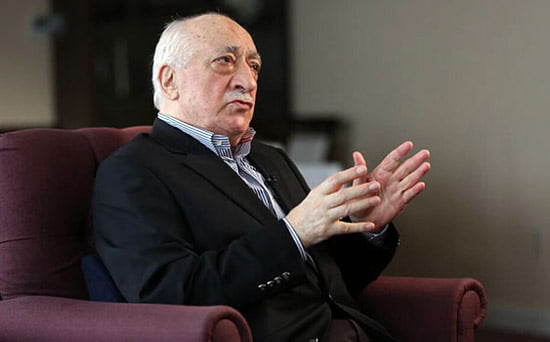Analysis: Power of Turkey’s Fethullah Gulen

Date posted: January 27, 2014
Guney Yildiz – BBC Turkish
To the Islamic scholar Fethullah Gulen, claims that he is in a bitter power struggle with Turkey’s prime minister are blown out of proportion.
Speaking in his Pennsylvania retreat, Mr Gulen, 74, said Turkey’s ruling AK Party was trying to “make our movement appear bigger than it already is and to frighten people”.
However, tensions with Prime Minister Recep Tayyip Erdogan, a former ally, caused Mr Gulen to explode in anger publicly in a video sermon last month.
Mr Gulen’s 50-year-old Hizmet (“Service”) movement has witnessed four military coups and emerged stronger largely by staying out of party politics.
But now it has a greater role in Turkish politics than at any time in its history.
Thousands of alleged Hizmet sympathisers in the police and judiciary have been demoted and reassigned to other jobs, since a corruption investigation was launched into figures with links to the government.
Now, with hindsight, we can say that Mr Erdogan had been preparing for this battle at least since the beginning of 2012. That was when prosecutors allegedly close to Hizmet tried to investigate the chief of the National Intelligence Organisation, a close ally of Mr Erdogan, who was conducting secret talks with the armed Kurdistan Workers’ Party (PKK).
Room for compromise?
At the height of the Gezi Park protests in Istanbul last summer, Mr Erdogan sought to consolidate his support among conservative voters, rather than making concessions to the left-wing, liberal and secularist-nationalist opposition.
But his AK Party shares that conservative base with Hizmet – and that was where the political battle between the two had to be fought.
I asked Mr Gulen whether he regretted any of the moves that led to the current tensions.
“I do not regret. And I do not criticise destiny. But I am not suggesting that everything done by the participants of this movement was always correct,” he said, in a tone suggesting that he is open to negotiations with the government.
Since its inception in Turkey as a congregation, his movement has grown into a national network connecting businesses, schools and media. It has become a global social movement in more than 150 countries.
Hizmet’s expansion coincided with the fall of the Soviet Union in 1991. Hizmet participants were already establishing themselves in Azerbaijan – culturally close to Turkey – before the collapse of USSR.
Hizmet does not fit into the usual categories for Islamic movements. Its focus is not on building a traditional Islamic state or reviving the Islamic “golden age”.
Instead the movement looks to the future and strives to educate a “Golden Generation” of Muslims to change the world.
Mr Gulen’s Pennsylvania retreat is in fact named after that central concept.
Grassroots support
He and Mr Erdogan have different approaches to reforming Turkish society. While Mr Erdogan seeks a top-down Islamisation of society through control of the state, Mr Gulen’s vision is to be more active at grassroots level right across society.
That approach has led to a generation of Gulen sympathisers occupying influential positions in the Turkish state, media and business community.
That influence from within has become increasingly challenging for Mr Erdogan, as he wants to govern Turkey with iron discipline, amid turbulent times both domestically and in the region.
He accuses Hizmet supporters within the state of plotting a “coup” against the government.
But the scale of the upheaval in the police, judiciary, Turkish state TV and other parts of the bureaucracy is already similar to what happens in a coup.
The current Erdogan-Gulen stand-off is reminiscent of Mustafa Kemal Ataturk’s hostile relations with Said-i Nursi, a politically active Kurdish preacher in the formative years of the Turkish Republic.
It is another struggle between a statesman and an Islamic scholar. But this time, the Islamic network is international, with many followers. It would not be easy for Mr Erdogan to uproot the movement in Turkey, let alone across the globe.
Kurdish tensions
According to Mr Erdogan, a disagreement over how best to achieve peace with the PKK rebels was a key factor in the split between the AK Party and Hizmet.
It is widely believed in Turkey that the massive recent operations against Kurdish politicians throughout the country were spearheaded by prosecutors and police officers close to Hizmet.
But when I asked Mr Gulen if he was against negotiations with the jailed PKK leader Abdullah Ocalan, or with PKK commanders in Iraqi Kurdistan, I got a very clear response: “We were never against negotiations with [Ocalan] or the PKK people in the mountains. But for some reason, we are portrayed as against the peace process.”
Turkey will enter an election cycle on 30 March with local elections, then presidential elections are expected later in the year, and general elections in 2015.
Mr Erdogan has a very difficult task to keep his electoral majority. He has to appear both conservative and nationalist, to limit the damage of the current stand-off with Hizmet, while continuing the Kurdish peace process that started over a year ago.
Mr Gulen said simply that his own supporters should vote for “whoever stands for the rule of law and rights, is upright and sound, whoever is respectful of democracy”.
Getting the interview
This was Mr Gulen’s first broadcast interview in 16 years.
His previous interviews were mostly via email.
The whole process of arranging it took at least a year.
In order to persuade him, I had to go through a series of interviews myself, by panels of Hizmet participants – from Europe, Turkey and the US.
It was postponed a couple of times and wasn’t confirmed until a day before, when I had a final meeting with Hizmet members in New York.
Younger participants, such as Kadir Uysaloglu, UK representative of Zaman newspaper, made an extraordinary effort to arrange the interview.
We were still not close to doing it even after arriving at the building where he was staying.
I have read reports about journalists getting within a few metres of him but having to go back to their offices without an interview.
I was told I could join him after his meal – he was one floor up, and messages still had to go through a couple of people.
The Hizmet participants are quite protective about him.
Related Story:
Source: BBC News , January 27, 2014
Tags: Fethullah Gulen | Hizmet and politics |
























